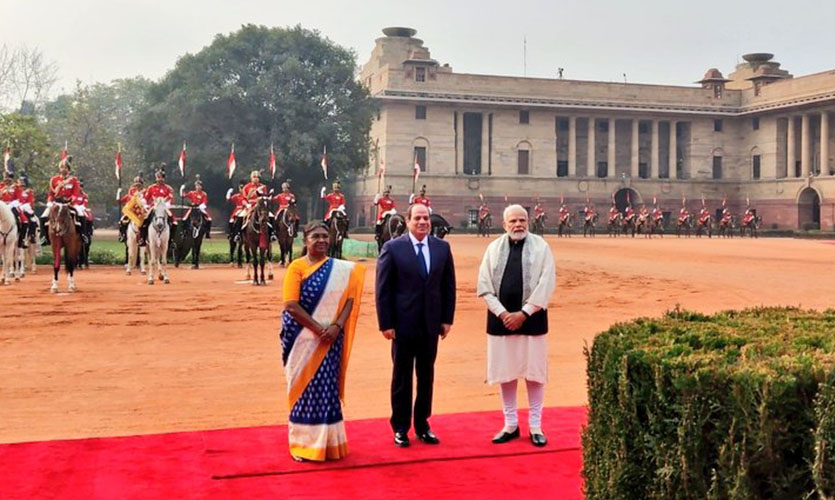A four-day India visit by Egyptian President Abdel Fateh el-Sisi commenced on Tuesday, also marking the first time an Egyptian leader has been invited as a chief guest for the Republic Day parade.
Officials have informed that during the visit, both countries will sign several MoUs and discuss ways to take ties forward on strategic issues, defence, trade, agriculture, and renewable energy.
Dr S Jaishankar, India’s Minister of External Affairs, will also meet with President Sisi. According to the ministry, the visiting dignitary is scheduled to meet with the Indian business sector at an event.
Aside from being seen as part of the government’s attempt to engage the “Global South”, Sisi’s invitation is also being viewed as reaffirmation of the non-alignment principles that have re-emerged since the Russian invasion of Ukraine in February last year. During the G-20 summit, Egypt has been invited as a special guest country, and Sisi, who has visited India twice before, is expected to return later in the year.
“Even without coordination, Egypt and India have similar positions at the United Nations today. We have civilisational ties, and the way our thinking has developed — principles of non-intervention, respectful of sovereignty, no use of force — these are all pertinent even today, as we have seen recently in the Ukraine conflict,” said a senior Egyptian official who formerly served as Ambassador in India, according to the Hindu.
A significant gesture by Prime Minister Narendra Modi’s administration was to invite Sisi to attend the Republic Day parade as the primary guest, during a time when multipolarity is being rediscovered. In response to the sanctions imposed by the West on Russia, the Modi government granted an exception to Egypt. A year ago, Egypt’s agriculture ministry announced that it had recognised India as a supplier of wheat as it sought to boost purchases from the North African nation.
“As the world’s largest importer of wheat, much of it from Ukraine and Russia, Egypt was in a uniquely vulnerable position, and India’s assistance bridged what could have become a major gap in supply for them,” said Navdeep Suri, former Indian Ambassador to Egypt. “The fact is in a world where the need for strategic autonomy is replacing many traditional alliances in the developing world, India and Egypt are finding more and more in common,” he added.
The Non-Alignment Movement (NAM) was founded in 1961, by India, Egypt, Yugoslavia, Indonesia, and Ghana. Former Indian prime minister Jawaharlal Nehru and former Egyptian president Gamal Abdel Nasser forged close ties between the countries, especially after India supported Egypt during the 1956 Suez Crisis. The bilateral ties between the two countries, however, declined over time, as India’s ties with the Gulf countries, where most of its oil was procured, grew stronger despite maintaining high-level visits and their commitment to the NAM.
Former Egyptian president Hosni Mubarak’s visit to India in 2008, was followed by former PM Manmohan Singh’s visit to Egypt for the NAM summit in 2009. Following the 2011 Egyptian Revolution, high-level contacts with Egypt resumed, and Mohamed Morsi, the president at the time, visited India in March 2013.
President Sisi was invited to the India-Africa Summit in 2015, and to a state visit in 2016, after PM Modi assumed office. However, he failed to attend the NAM Summits in Venezuela and Azerbaijan in 2016 and 2019, indicating a potential shift from the grouping. During the COVID-19 pandemic summit hosted by Azerbaijan in 2020, PM Modi attended a virtual meeting.
In August 2015, after President Sisi’s new government took power in June 2014, the External Affairs Minister at the time – Sushma Swaraj – visited Cairo. PM Modi met President Sisi on the sidelines of the United Nations General Assembly (UNGA) in New York in September 2015. Former president Pranab Mukherjee and PM Modi met Sisi in New Delhi, in October 2015, at the third India-Africa Forum Summit.
President Sisi also conducted a state visit to India in September 2016. A joint declaration outlined the three pillars of political-security cooperation, economic engagement and scientific collaboration, and cultural and people-to-people relations as the foundation of a new partnership for a new era.
“I can tell you that the main principles, the founding principles of the non-aligned movement did not disappear. There might have been some global changes that pushed the NAM itself into the background, but it doesn’t change our positions,” informed an Egyptian diplomat. Wishing to remain anonymous, he also noted that the G-77 and “South-South cooperation” that Egypt and India are actively participating in are outcomes of the NAM movement.
“With a population of almost 110 million, a location that straddles Africa and Asia, a standing Army that is the largest in the region, a capital that hosts the League of Arab States and a diplomatic presence that punches above its weight in global affairs, Egypt is a pivotal player,” said Suri in an ORF journal article.
Read more: Widespread Power Outages Engulf Pakistan Amid Economic Crisis










